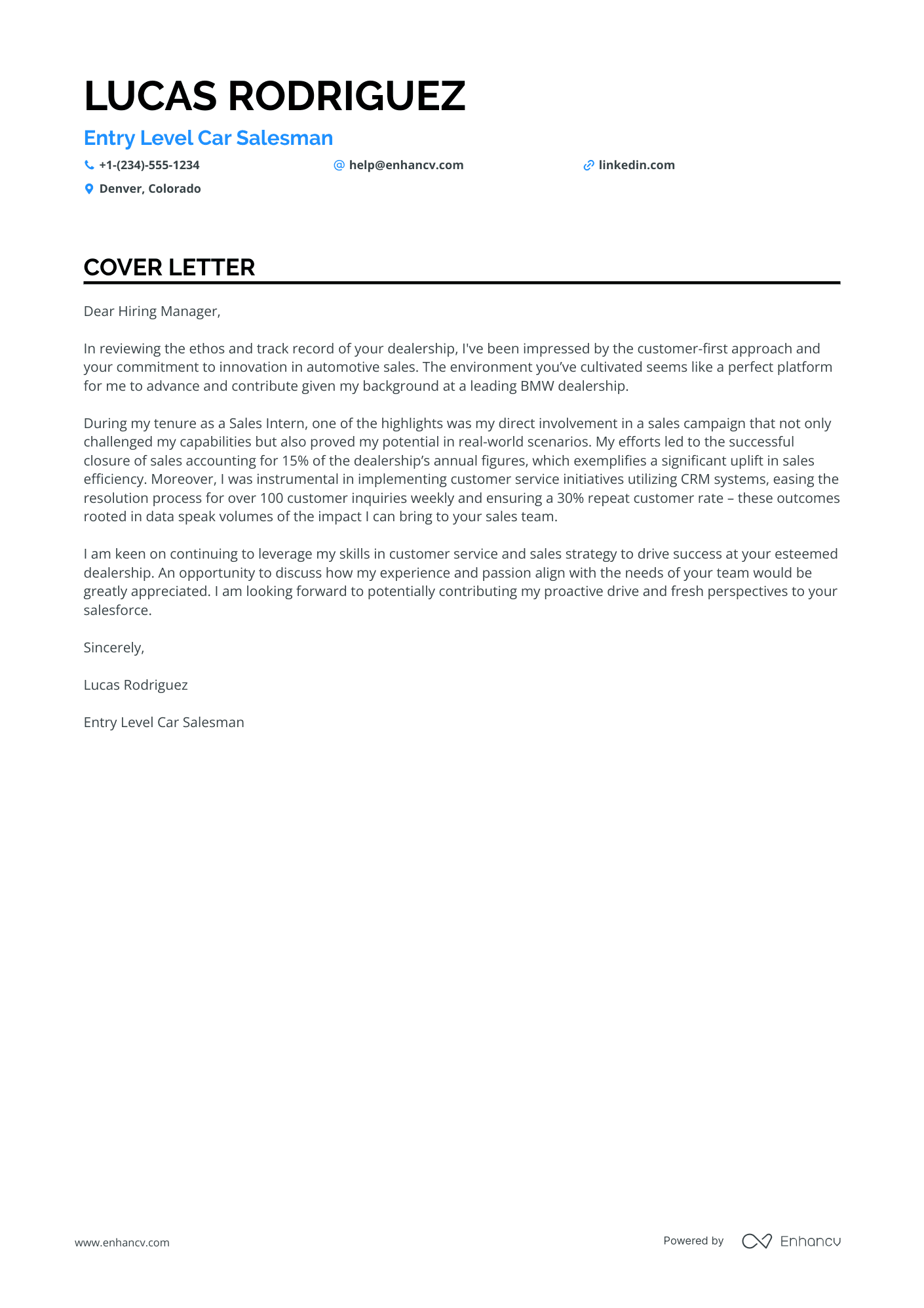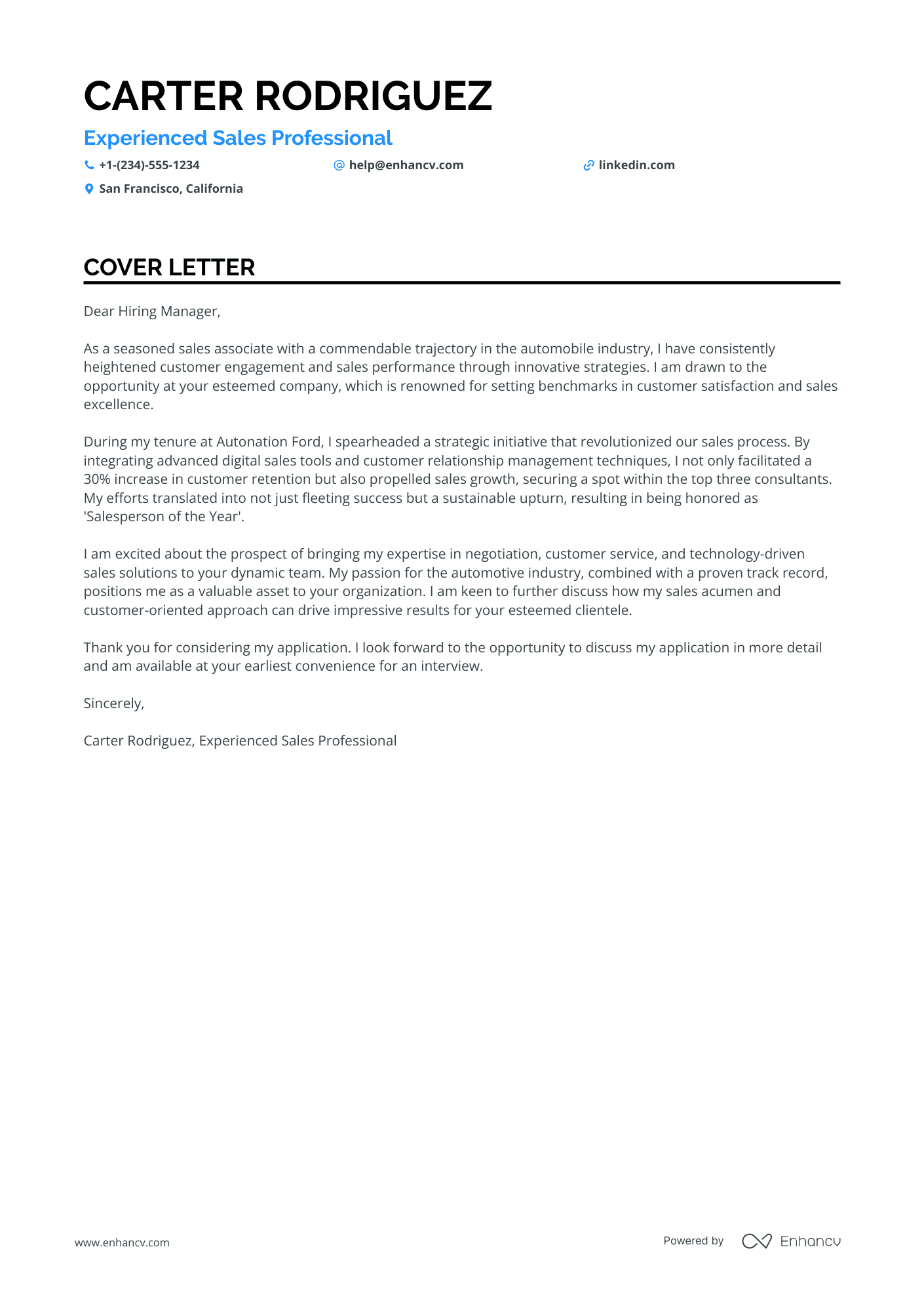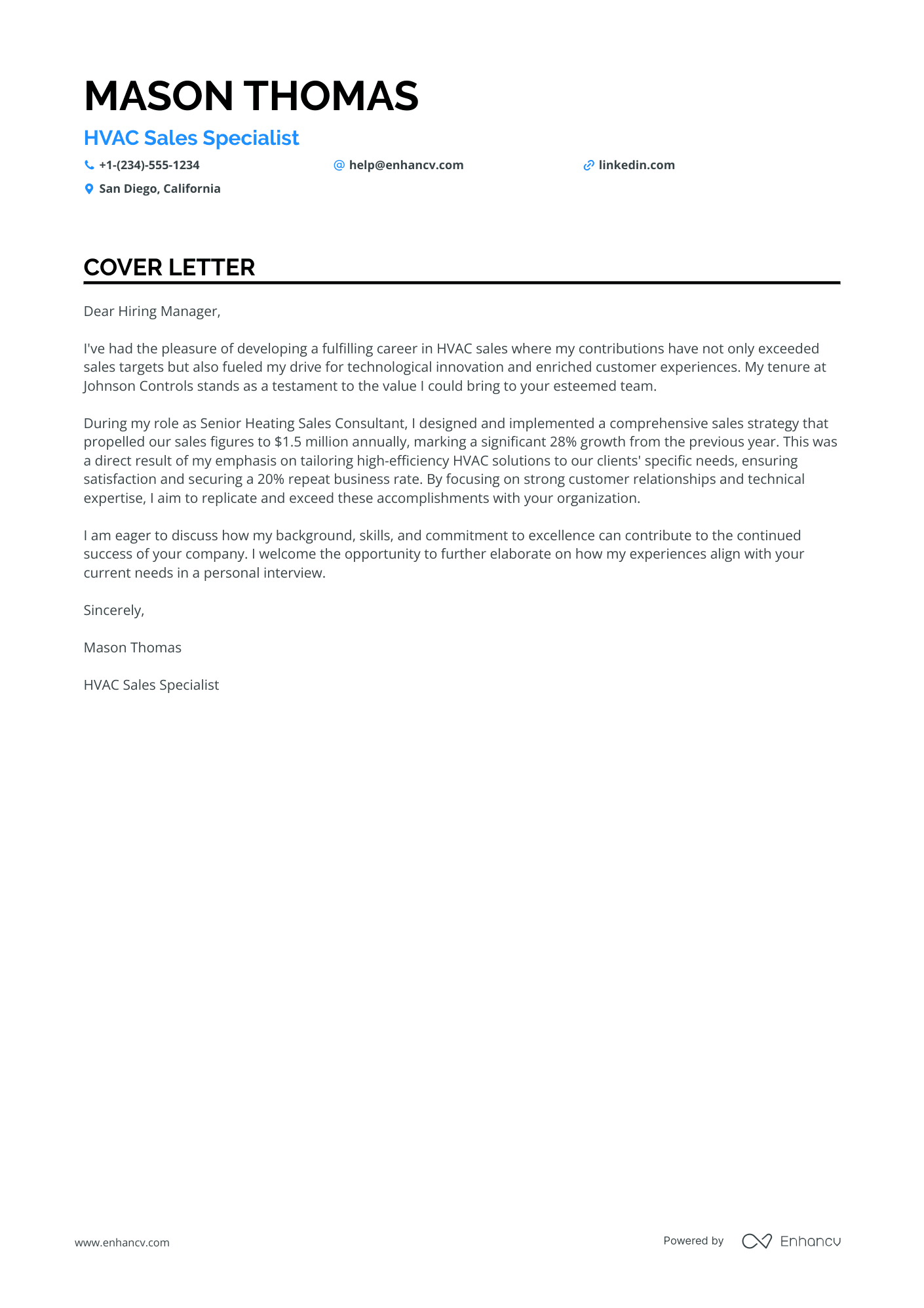Crafting a compelling car salesman cover letter can be the roadblock standing between you and your dream job in auto sales. You've polished your resume and you know you shouldn't just repeat it in your cover letter. Instead, steer towards narrating your proudest professional triumph, weaving it into a story that captures your unique skills. Remember, while formality matters, dodge the cliches and keep it concise—your standout story should fit on a single page.
- Making excellent use of job-winning real-life professional cover letters;
- Writing the first paragraphs of your car salesman cover letter to get attention and connect with the recruiters - immediately;
- Single out your most noteworthy achievement (even if it's outside your career);
- Get a better understanding of what you must include in your car salesman cover letter to land the job.
Let the power of Enhancv's AI work for you: create your car salesman cover letter by uploading your resume.
If the car salesman isn't exactly the one you're looking for we have a plethora of cover letter examples for jobs like this one:
- Car Salesman resume guide and example
- Call Center Representative cover letter example
- Field Sales Representative cover letter example
- Sales Account Manager cover letter example
- Convenience Store Manager cover letter example
- Walmart Stocker cover letter example
- Salesman cover letter example
- Call Center Supervisor cover letter example
- Online Sales Manager cover letter example
- Store Manager cover letter example
- Pharmaceutical Sales Rep cover letter example
Drop your resume here or choose a file.
PDF & DOCX only. Max 2MB file size.
Car salesman cover letter example
ISABELLE TODD
Chicago, IL
+1-(234)-555-1234
help@enhancv.com
- Emphasizing major achievements — The cover letter highlights a significant $300K surge in upsells, showcasing the candidate's ability to generate revenue and engage new customers effectively.
- Alignment with the company's goals — The candidate aligns their experience with the organization's objectives, signaling that they understand and can contribute to the company's strategic direction.
- Demonstrating leadership — By mentioning the role as VP of Automotive Sales, the applicant shows leadership experience and the capability to lead strategic initiatives within the company.
Designing your car salesman cover letter: what is the best format
Let's start with the basics, your car salesman cover letter should include your:
- Header
- Greeting
- Introduction
- Body paragraph
- Closing statement
- Signature (that's not a must)
Next, we'll move to the spacing of your car salesman cover letter, and yes, it should be single-spaced (automatically formatted for you in our cover letter templates).
Don't go for a old-school font (e.g. Arial or Times New Roman), but instead, pick an ATS-favorite like Chivo, Volkhov, or Raleway, to stand out.
Our cover letter builder is also set up for you with the standard one-inch margin, all around the text.
Finally, ensure your car salesman resume and cover letter are in the same font and are submitted in PDF (to keep the formatting in place).
P.S. The Applicant Tracker System (or ATS) won't be assessing your [job] cover letter, it's solely for the recruiters' eyes.
Struggling to find time to write a cover letter? Try our free cover letter generator to create one in just seconds, straight from your resume.
The top sections on a car salesman cover letter
- Header (Including Contact Information and Date): This section establishes your professional identity and provides essential information for the recruiter to reach out to you, setting a formal tone for the cover letter.
- Greeting (Addressed to a Specific Individual): A personalized greeting shows that you have done your research on the dealership and are directly engaging with the recipient, which helps build an initial rapport.
- Introduction (Mentioning Your Passion for Sales and Cars): This opening section should instantly capture the recruiter's attention by linking your enthusiasm for sales with a genuine interest in the automotive industry, making your application memorable.
- Sales Experience and Achievements Section: Highlight your previous sales successes, customer service skills, and any car-specific knowledge, demonstrating how your background uniquely qualifies you for the role of a car salesman.
- Closing and Call to Action: Concisely summarize your enthusiasm for the position, restate your fit for the job, and include a proactive call to action, encouraging the recruiter to contact you for a discussion or interview.
Key qualities recruiters search for in a candidate’s cover letter
- Strong communication skills: To effectively convey information about cars and financing options to customers.
- Persuasive negotiation abilities: To close sales and ensure both the customer and dealership benefit from the transaction.
- In-depth knowledge of automotive industry and current market trends: To provide accurate information and recommendations tailored to customer needs.
- Customer service orientation: To build long-lasting relationships and encourage repeat business and referrals.
- Tenacity and resilience: To maintain motivation and continue pursuing sales targets despite potential rejections and challenges.
- Adaptability and learning aptitude: To quickly learn about new vehicle models, features, and technologies as they are released.
What greeting should you use in your car salesman cover letter salutation
A simple "Hello" or "Hey" just won't work.
With your car salesman cover letter salutation, you set the tone of the whole communication.
You should thus address the hiring managers by using their first (or last name) in your greeting.
But how do you find out who's recruiting for the role?
The easiest way is to look up the role on LinkedIn or the corporate website.
Alternatively, you could also contact the organization via social media or email, for more information.
Unable to still obtain the recruiter's name?
Don't go down the "To whom it may concern path". Instead, start your cover letter with a "Dear HR team".
List of salutations you can use
- Dear Hiring Manager,
- Dear [Company Name] Team,
- Dear [Department Name] Hiring Team,
- Dear Mr./Ms. [Last Name],
- Dear [First Name] [Last Name],
What to include in those first two sentences, or your car salesman cover letter introduction
Have you ever wondered what the best way is to present your profile in the car salesman cover letter introduction?
There's no right or wrong answer if you're being concise and authentic to yourself.
Some professionals start their car salesman cover letter by:
- congratulating the company - focusing on something impressive, whether that's an award, an industry-leading project, or a key event;
- aligning their passion for the field or industry with the job - if you're enthusiastic about what you do, you'd thus grow your skill set and value as a professional.
The middle or body of your car salesman cover letter body: a great instrument to tell a story
Now that you've set the right tone with the greeting and introduction of your car salesman cover letter, it's time to get down to business.
Hear us out, the body of your car salesman cover letter is the best storytelling instrument you have, in your job-hunting arsenal.
Writing the next three to six paragraphs, take the time to reassess the advert to discover job-crucial requirements.
Next, choose one accomplishment that covers those key skills and talents.
Use precisely that achievement to tell an exciting story of how you match the ideal candidate profile.
In the undertones of your story or car salesman cover letter body, hint at the difference you'd make and sell your application as the perfect one for the job.
Thinking about the closing paragraph of your car salesman cover letter
Before your signature, you have extra space to close off your car salesman cover letter.
Use it to either make a promise or look to the future.
Remind recruiters how invaluable of a candidate you are by showing what you plan to achieve in the role.
Also, note your availability for a potential next meeting (in person or over the telephone).
By showing recruiters that you're thinking about the future, you'd come off as both interested in the opportunity and responsible.
No experience car salesman cover letter: making the most out of your profile
Candidates who happen to have no professional experience use their car salesman cover letter to stand out.
Instead of focusing on a professional achievement, aim to quantify all the relevant, transferrable skills from your life experience.
Once again, the best practice to do so would be to select an accomplishment - from your whole career history.
Another option would be to plan out your career goals and objectives: how do you see yourself growing, as a professional, in the next five years, thanks to this opportunity?
Be precise and concise about your dreams, and align them with the company vision.
Key takeaways
Writing your car salesman cover letter doesn't need to turn into an endless quest, but instead:
- Create an individual car salesman cover letter for each role you apply to, based on job criteria (use our builder to transform your resume into a cover letter, which you could edit to match the job);
- Stick with the same font you've used in your resume (e.g. Raleway) and ensure your car salesman cover letter is single-spaced and has a one-inch margin all around;
- Introduce your enthusiasm for the role or the company at the beginning of your car salesman cover letter to make a good first impression;
- Align what matters most to the company by selecting just one achievement from your experience, that has taught you valuable skills and knowledge for the job;
- End your car salesman cover letter like any good story - with a promise for greatness or follow-up for an interview.
Car Salesman cover letter examples
By Experience
Entry Level Car Salesman
By Role













